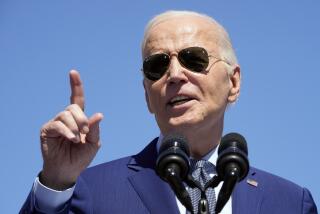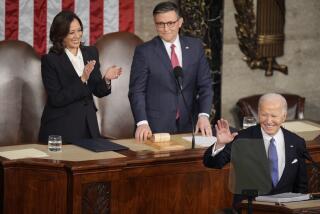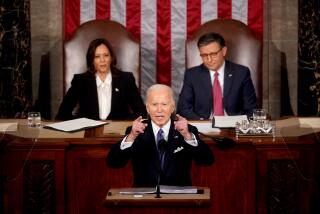In State of the Union, Obama focuses on America’s economic divide
WASHINGTON — Hoping to leave a bruising year in the rearview mirror, President Obama vowed Tuesday to work with Congress when possible but around it when necessary to push ahead with a series of mostly modest steps aimed at helping low- and middle-income families share in the economic recovery.
In his State of the Union address, Obama shook off his earlier recession-era rhetoric to envision an increasingly robust economy. He warned Congress not to impede that progress, and swore he would work to shrink the gap between rich and poor left by the years of job losses and depressed wages.
“I believe this can be a breakthrough year for America. After five years of grit and determined effort, the United States is better positioned for the 21st century than any other nation on Earth,” Obama told a joint session of Congress in the annual address.
“For several years now, this town has been consumed by a rancorous argument over the proper size of the federal government. …When that debate prevents us from carrying out even the most basic functions of our democracy — when our differences shut down government or threaten the full faith and credit of the United States — then we are not doing right by the American people.”
The speech represented an attempt at a political comeback for the president, whose approval rating was damaged by the disastrous rollout of his signature healthcare law and whose Democratic Party faces the prospect of losing control of the Senate in the November election. Obama mounted his most pointed recent defense of the healthcare law, and issued a challenge to Republican critics to put forward their own plans.
“The American people are not interested in refighting old battles,” Obama said to the Republican lawmakers seated before him. “Tell America what you’d do differently.”
But the moment was a rare sharp elbow in a speech that included gestures of bipartisan outreach and efforts to distance himself from battles on Capitol Hill. Obama promised to take his own path to boost wages, protect the environment and channel resources to education, starting with an executive order to raise the minimum wage for federal contractors.
“America does not stand still, and neither will I,” Obama said. “So wherever and whenever I can take steps without legislation to expand opportunity for more American families, that’s what I’m going to do.”
Republicans countered with their own message on how to address economic disparity. Rep. Cathy McMorris Rodgers of Washington state delivered the official GOP response, which she described as a “more hopeful” vision.
“It’s one that champions free markets and trusts people to make their own decisions, not a government that decides for you,” she said. “Because our mission, not only as Republicans but as Americans, is to once again ensure that we are not bound by where we come from, but empowered by what we can become. That is the gap Republicans are working to close.”
Republicans bristled Tuesday at the president’s vows to use his pen to order executive actions and his phone to rally the public to his causes, questioning whether Obama could really find middle ground.
“For all his talk of going around Congress, he wouldn’t have to if he’d actually try to work with the people’s elected representatives every now and then,” Senate Minority Leader Mitch McConnell (R-Ky.) said. “I’m saying, don’t talk about using the phone, just use it. And please, be serious when you call.”
Obama’s minimum-wage announcement was a clear example of his effort to bypass congressional roadblocks — and the limits of how far he can travel on that route. Obama plans to sign an executive order raising wages for workers employed by federal contractors to $10.10 per hour, up from the current minimum of $7.25.
The increase would largely affect service employees — such as cafeteria workers and busboys at Smithsonian museums — bringing a full-time employee from $15,000 a year to $21,000.
The White House offered no information on how many people would be affected. Outside experts and allies put the estimate at several hundred thousand, a mere slice of the approximately 2 million people employed by federal contractors.
Obama urged Congress to increase the federal minimum wage, stressing the benefit to women, who hold a majority of lower-wage jobs and are an important swing vote in this year’s congressional elections. Raising women’s pay is just one way to “do away with workplace policies that belong in a ‘Mad Men’ episode,” he said.
White House and Democratic strategists believe the issue may find bipartisan backing in an election year. Recent polls show most Americans favor raising the minimum wage — nearly three-quarters said so in a Pew Research poll conducted this month — although Republicans are sharply divided on the issue.
Obama also highlighted other elements of his agenda to address economic inequality, calling on Congress to expand unemployment benefits for the long-term jobless and touting new commitments from chief executives of corporations who’d agreed not discriminate against applicants because of extended stretches out of work.
At times, Obama alluded to ambitious plans of his past.
He mentioned last year’s ill-fated effort, born out of the shooting rampage at Sandy Hook Elementary School in late 2012 that left 20 children and six educators dead, to pass new gun-control measures. He vowed to “keep trying, with or without Congress,” but laid out no specific plans. And he tread lightly on immigration reform, hoping not to upset the delicate negotiations among Republican lawmakers.
On Tuesday, Obama was intent on setting more manageable goals in a time of intense partisan intransigence.
The president said he intended to speed up implementation of the ConnectEd program, his plan to connect all schools to the Internet. He said he would create a “starter savings account” to help people who don’t have 401(k) plans or pensions for retirement.
He reminded listeners of his power to regulate power plant emissions, noting that the shift to cleaner energy would require “tough choices.” “Climate change is a fact,” he said. “And when our children’s children look us in the eye and ask if we did all we could to leave them a safer, more stable world … I want us to be able to say yes, we did.”
Obama proposed some initiatives that would need congressional approval. He called for expansion of the earned income tax credit for workers without children, including non-custodial parents. The idea, which Obama has promoted before, is to raise the maximum credit and make it available to more low-wage workers.
The White House is also seeking to show what one official described as “creative” uses of its power that don’t involve executive orders or legislation. Obama plans to meet with CEOs to encourage them to hire the long-term unemployed, meet with college presidents to talk about affordability, and initiate a partnership with businesses, community colleges and labor unions to create more on-the-job apprenticeships.
The president has already publicized some of these efforts and plans more events. On Wednesday, he’ll set out on a two-day, four-state tour that starts at a Costco in Maryland. The big-box retailer has raised wages above the required minimum.
Obama’s remarks were overwhelmingly focused on domestic policy. He waited until the end of his speech, which lasted more than an hour, to make an extended reference to the war in Afghanistan. He said that he had put Al Qaeda’s leadership “on a path to defeat” and noted that he had reduced the number of U.S. troops there.
He pledged to support the rebels in Syria, but made no commitment to provide further aid.
He took credit for an interim deal with Iran to freeze its nuclear program, but warned lawmakers not to interfere with the negotiations by enacting more sanctions.
“If this Congress sends me a new sanctions bill now that threatens to derail these talks, I will veto it,” he said. “If Iran’s leaders do not seize this opportunity, then I will be the first to call for more sanctions.”
Obama also offered a moving tribute to a wounded soldier, Sgt. 1st Class Cory Remsburg, an Army Ranger who was nearly killed by a roadside bomb in Afghanistan and who has suffered through surgeries and rehabilitation.
Remsburg, his head scarred and partially shaved, sat with First Lady Michelle Obama in the gallery and rose slowly to applause.
“Our freedom, our democracy, has never been easy,” Obama said. “Sometimes we stumble; we make mistakes.”
kathleen.hennessey@latimes.com
More to Read
Start your day right
Sign up for Essential California for news, features and recommendations from the L.A. Times and beyond in your inbox six days a week.
You may occasionally receive promotional content from the Los Angeles Times.








